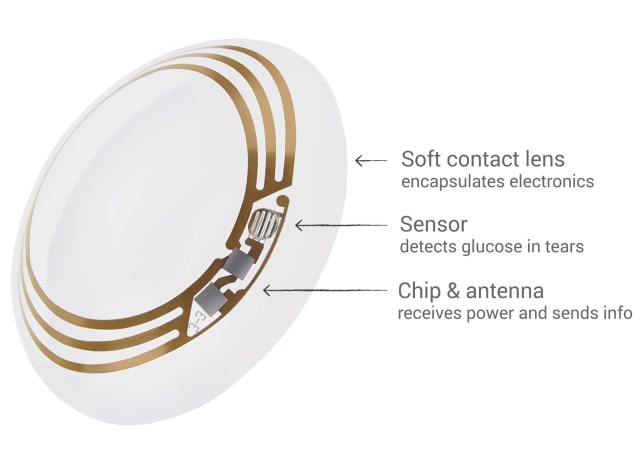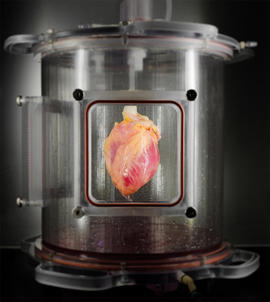Google’s Diabetes Moon Shot: A Smart Contact Lens for Diabetes Patients, by Liz Gannes and James Temple
Adam Rifkin stashed this in Virtual Reality!
Stashed in: Google!, @lizgannes, Medicine, Singularity!, Diabetes, Innovation, Google
Liz Gannes and James Temple explain:
Google has shrunk down a chip and sensor system so small it can be embedded in a contact lens.
Instead of a circuit board, the tiny pieces areconnected to a circular gold foil antenna mounted on a flexible plastic-like material that comfortably sits on a person’s eye, outside of their own sight.
Why? To help people with diabetes.
Google’s smart contact lens project is designed to measure the glucose content of the wearer’s tears, once every second. Theoretically, it could be a noninvasive way for diabetics to keep their blood sugar levels in check, rather than pricking their skin to sample their blood multiple times per day, or wearing a continuous monitoring device that’s stabbed into their side to tap into subcutaneous tissue.
If the smart contact lens ever makes it to market, it could be welcome news for the more than 380 million people worldwide with diabetes — a number that could reach beyond 590 million by 2035, according to the International Diabetes Federation.
The smart contact lens was designed by a team of chip designers, software engineers, electrical chemists and polymer chemists from Google X, the company’s secretive in-house research division that also designs other so-called “moon shot” projects like self-driving cars and Internet-connected eyewear. It holds the promise that maybe someday diabetes patients will be able to get ongoing measurements without ever breaking their skin.
Only starting the process with the FDA, but it's still an exciting development.
Google was not the first to prototype this but they seem eager in pushing the state of the art.
Very innovative, but I don't know if I would want to wear a contact 24 hrs a day, if it wasn't needed for vision, even the soft ones are not all that comfortable. If one were a brittle diabetic, than I could see a bigger payoff for a device like this.
Diabetics don't have to monitor their glucose 24 hours a day -- could be useful for waking hours.
Also, other sensors could monitor other body systems. This feels like just the beginning.
When it's not worn on the eyeball, I'm in ;)
Google already has been experimenting with smart watches and smart glasses.
I'm sure more wearables (and implantables?) will be available in the future.
Smart tattoo, anyone?
Along that line: Expect Google to experiment with nanotechnology and nanobots in the future, too.
I wonder if one day soon we'll see Google Healthcare ......
Definitely. Not a question of if, but when.


















11:34 PM Jan 16 2014